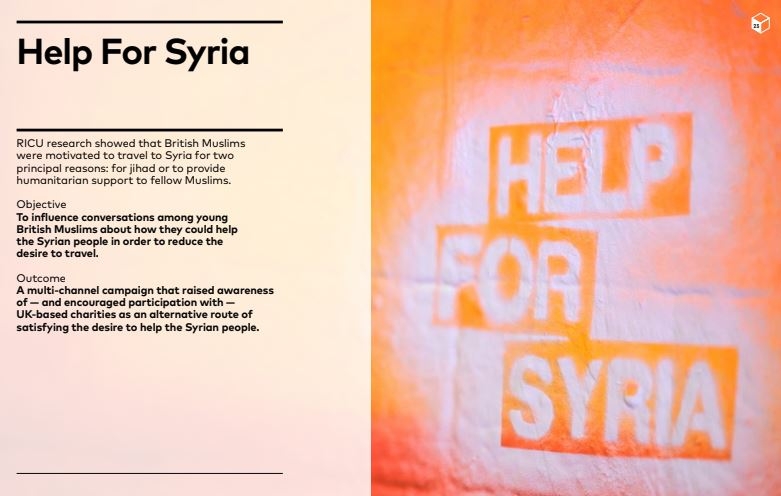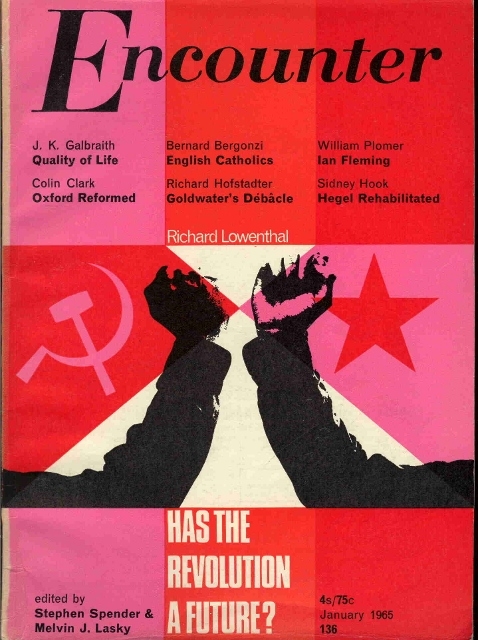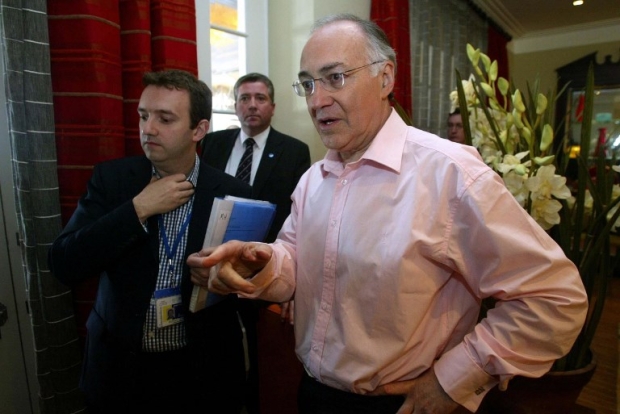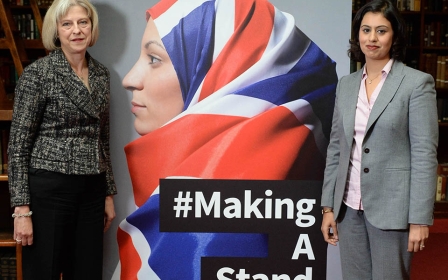How a book on Cold War propaganda inspired British counter-terror campaign

A covert propaganda unit created by the British government in a bid to win Muslim hearts and minds was inspired by a history of the Cold War that warned of the dangers of propaganda, according to a number of officials involved in the scheme.
Founded in 2007, the Research, Information and Communications Unit (RICU), which says privately that it aims to “effect attitudinal and behavioural change” through methods including the dissemination of messages on social media, leafleting homes and feeding stories to newspapers, was modelled on a secretive anti-communist body called the Information Research Department (IRD), set up in Britain in 1948.
Counter-terrorism officials at the Home Office, who set up RICU as part of the controversial counter-radicalisation strategy known as Prevent, became aware of the work of the IRD after reading a history of the Cold War called Who Paid the Piper?, which was published in the US under the title The Cultural Cold War.
The author of the book, British historian Frances Stonor Saunders, describes the way in which the IRD and the CIA co-opted Western artists, writers and intellectuals in order to combat the cultural influences of the Soviet Union. One of their best-known creations was a literary magazine called Encounter.
“There was a rumour that Brown had been impressed and perhaps influenced by Who Paid the Piper?" says one.
“People in Whitehall like to keep up with ministers’ ideas and their sources so it became required reading for a short time.”
Instead of reading Saunders’ book as a warning that propaganda could undermine intellectual and political freedom, some at RICU saw it as a manual for the organisation’s future development.
“The IRD was not wholly lost from folk memory but it may have been partly through reading this book that younger civil servants first became aware of it and some speculated that RICU could recreate it.”
'Innovative approaches'
RICU is said to have initially operated like a press office, sending newspaper cuttings to various government offices and missions abroad, but became more closely modelled on the IRD after the appointment of a new head, Richard Chalk, in 2012.
Previously, Chalk had been part of a team employed by the British public relations firm Bell Pottinger to produce covert propaganda in Iraq, while under contract to the Pentagon and the CIA.
Around the time Chalk was appointed to RICU, Theresa May – at that time the Home Secretary – told the parliamentary intelligence and security committee that provides oversight of her department’s Office for Security and Counter-Terrorism (OSCT) that RICU was “road-testing some quite innovative approaches to counter-ideological messages."
RICU recruited anthropologists, linguists, psychologists and digital marketing specialists, according to briefing notes prepared at this time.
Probation officers, police and intelligence officers were also attached to the unit. It operates within the OSCT, whose first head was Charles Farr, a former officer for Britain's foreign intelligence service, MI6, but answers to the UK Foreign Office as well as the Home Office.
The unit began monitoring traditional and online media, analysed audience reactions and - as part of Prevent - began developing messages to be directed at “audiences vulnerable to terrorism”, according to the briefing notes. One aim was to "deliver communications that mitigate the impact of extemist communications".
Before long, RICU was covertly leafleting homes across the UK, hosting stalls at events for students newly-arrived at university, providing media to be disseminated through Muslim civil society groups on websites, Facebook and Twitter, and establishing a PR company that would persuade journalists to take an interest in these groups.
At no point was anyone who received these messages informed that they had originated with the British government.
Documents seen by Middle East Eye show that the messages were aimed at what RICU described as “Prevent audiences”, which are defined as “British Muslims, particularly males, aged 15 to 39".
One example was RICU’s Help for Syria operation, which ran from 2013 to 2016: a website, Facebook page, YouTube channel and Twitter feed which appeared to be operated by a charity, but was actually run by RICU.
The intention of the campaign was to dissuade people from travelling to Syria, with documents seen by MEE stating that the objective was "to influence conversations among young British Muslims about how they could help the Syrian people in order to reduce the desire to travel."
Stalls were set up at universities across the UK, at which staff had conversations with more than 10,000 students; it reached 1,138,000 Facebook users each week and its leaflets were delivered to 760,000 households across the UK. The Help for Syria Facebook page is still live and is liked by over 56,000 users.
The campaign concentrated upon “areas of geographic interest to Her Majesty’s Government,” thought to be a reference to areas with large Muslim populations. Nobody contacted by the campaign was told that it was a government initiative.
Another operation was launched in December 2013 after BBC radio’s flagship morning programme, Today, used a slot usually reserved for major political interviews to talk to Anjem Choudary, a widely-condemned Islamist activist who would later be convicted of a terrorist offence.
By the end of the day, a series of short films had appeared on YouTube, featuring Muslims who were denouncing both Choudary and the BBC for giving him air time. A number of the participants were, in fact, working with the Prevent programme.
'Reconciled British Muslim identity'
The London communications company that has been contracted to produce most of the media messages, including the Help for Syria campaign, is Breakthrough Media. One of the company’s directors was also previously engaged in Bell Pottinger’s counter-insurgency propaganda in Iraq.
According to large numbers of documents seen by MEE, Breakthrough sees the overall aim of its work with RICU as being to “promote a reconciled British Muslim identity”.
The company worked hard for many years to conceal the fact that its client was RICU, rather than the groups through which it disseminated its messages.
At one point it assured RICU that it “understands the sensitive nature of RICU’s work and adheres to the highest standards of security and confidentiality".
It accepted that if RICU’s involvement were to be exposed, there would be a negative impact on the campaign, as “any content or messaging attributed to the state are highly unlikely to have any credibility among these audiences."
Furthermore, there would be “a negative impact on RICU, Prevent and the Home Office’s reputation."
People who have worked at RICU and Breakthrough say that through data-driven interventions, they found that they could target their Muslim audiences with ever-increasing efficiency and reach, in much the same way that political campaign groups – and the Russian state – were found to have done during the 2016 US presidential election.
These employees rarely describe their work as propaganda, preferring to use the term “strategic communications”. People have moved frequently between the two organisations, and at both there are individuals who describe themselves as “the new IRD”.
The documents make clear that RICU has been attempting to change the way young British Muslims think and act. They talk about “implementing attitudinal and behavioural change communications” and “measurable attitudinal change outcomes”. The unit’s campaigns are “designed to deliver real attitudinal and behavioural change”.
When the Islamic State (IS) group began distributing its own propaganda media, RICU stepped up its operations, telling officials at the United Nations that it had begun delivering “sophisticated communications campaigns that utilise audiovisual products on and at an industrial scale and pace”.
Today, RICU is providing consultancy services to the European Strategic Communications Network, a Belgian-led project funded by the EU.
An MEE investigation has also revealed how RICU is working with the British Council on counter-extremism campaigns in Tunisia, Morocco and Lebanon.
The Prevent programme as a whole has faced repeated criticism, particularly after its focus switched in 2011 from countering violent extremism, to combating extremism, whether violent or not, and to promoting so-called “British values”.
In a campaign that echoed the IRD and CIA campaigns detailed by Saunders, RICU was tasked to use secrecy and subterfuge to promote values that included not only tolerance, democracy and the rule of law but also transparency, free debate and candour.
RICU and its “strategic communications” remain central features of the Prevent programme.
A major review of the UK’s counter terrorism strategy, which was completed earlier this year, hailed the unit as a means by which the government can “amplify” the voices of civil society groups that are combatting terrorists’ ideology and propaganda.
Moreover, the unit is being increasingly well funded. Its Home Office funding has risen steadily each year, from £3.66m ($4.7m) in 2008-9 to £16.1m ($20.6m) in 2017-18. Further funding is thought to come from the Foreign Office.
Middle East Eye propose une couverture et une analyse indépendantes et incomparables du Moyen-Orient, de l’Afrique du Nord et d’autres régions du monde. Pour en savoir plus sur la reprise de ce contenu et les frais qui s’appliquent, veuillez remplir ce formulaire [en anglais]. Pour en savoir plus sur MEE, cliquez ici [en anglais].






